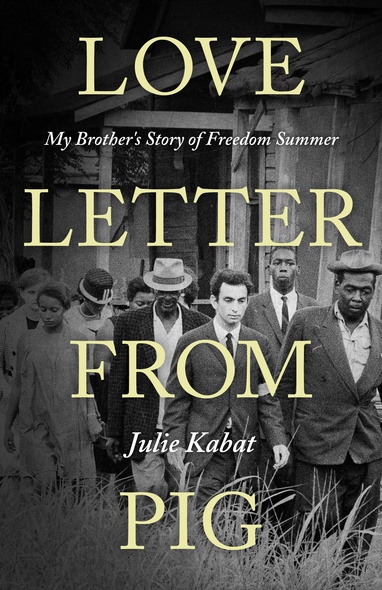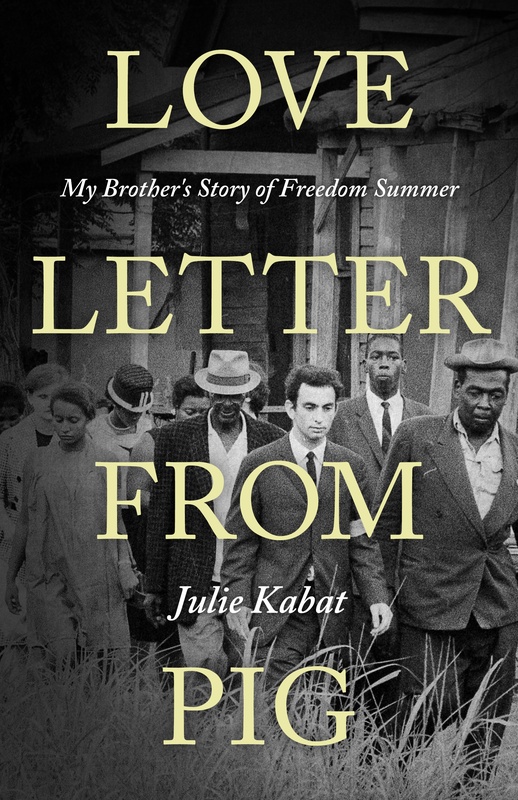
Love Letter from Pig
My Brother's Story of Freedom Summer
In the summer of 1964, the FBI found the smoldering remains of the station wagon that James Chaney, Michael Schwerner, and Andrew Goodman had been driving before their disappearance. Shortly after this awful discovery, Julie Kabat’s beloved brother Luke arrived as a volunteer for the Mississippi Summer Project. Teaching biology to Freedom School students in Meridian, Luke became one of more than seven hundred student volunteers who joined experienced Black civil rights workers and clergy to challenge white supremacy in the nation’s most segregated state. During his time in Mississippi, Luke helped plan the community memorial service for Chaney, attended the Democratic National Convention in support of the Mississippi Freedom Democratic Party, and even spent time in jail for “contributing to the delinquency of minors.” This arrest followed his decision to take students out for ice cream. Through his activism, Luke grappled with many issues that continue to haunt and divide us today: racialized oppression, threats of violence, and segregation whether explicit in law or implicit through custom.
Sadly, Luke died just two years after Freedom Summer, leaving behind copious letters, diaries, and essays, as well as a lasting impact on his younger sister, nicknamed “Pig.” Drawing on a wealth of primary resources, especially her brother’s letters and diaries, Kabat delves deep into her family history to understand Luke’s motivations for joining the movement and documents his experiences as an activist. In addition to Luke’s personal narrative, Kabat includes conversations with surviving Freedom School volunteers and students who declare the life-long legacy of Freedom Summer. A sister’s tribute to her brother, Love Letter from Pig: My Brother’s Story of Freedom Summer addresses ongoing issues of civil rights and racial inequality facing the nation today.
While in Mississippi, Luke kept meticulous notes, initially scribbling thoughts on an airplane napkin. After passing away from cancer two years after his initial experience in Mississippi, and right before graduating medical school, he never got to write his planned book. So, fifty years later, his younger sister has taken up the mantle and brought readers into the movement and her brother’s mind in an engaging way.
This is the endearing and historically relevant account of a sister’s admiration for her late big brother.
Julie Kabat has written a remarkable book. Love Letter from Pig introduces us to her brother Luke, a third-year medical student teaching in a Mississippi Freedom School. Through Luke we meet his students, thrilled at being exposed to new knowledge; family members, concerned about his welfare; and fellow Freedom Summer volunteers. Love Letter from Pig is about idealism and courage in the face of adversity, but mostly it’s about love.
This story is an in-depth look at the life of a history maker, a change agent, a blazing star called Lucien Kabat. He was our teacher, and he was our friend. He fought bigotry with kindness, violence with humility, injustice through peace, and hate with love. It makes me believe he was an angel on loan to us from the Heavens. Rest well, dear friend. Some day we will overcome!
Love Letter from Pig recounts the complicated story of courageous, nonviolent actions against the exploitation of Black Americans in rural Mississippi. While some changes have occurred in Philadelphia and Meridian, Mississippi, the unlearned lessons of that time persist in America. Kabat’s story reveals the tragic outcomes often embedded in the fight for justice and freedom.
Drawing on a wealth of resources—her brother’s diaries and letters, periodicals and books, radio and television, and interviews, some made at the fiftieth anniversary of Freedom Summer in 2014—Julie Kabat creates a compelling story about a significant period in the nation’s history and addresses continuing issues of civil rights and racial equality.
Kabat’s beautiful, moving memoir of her brother Luke’s civil rights activism in Meridian, Mississippi during Freedom Summer is at once a compelling historical document and deeply personal homage. Luke, a medical student at Stanford, left the safety of Palo Alto in the summer of 1964 to be one of more than seven hundred student activists risking their lives for racial equality. He’d had a good role model in his own father, blacklisted during the McCarthy era for refusing to fire other blacklisted doctors. Forced to move to Providence, Rhode Island for the only work in his field he could get, he and his family were met by the discreet wall of genteel anti-Semitism. It is in the context of this silent shunning that the deep bond between Julie and her brother grew and thrived, and his own activism was born. By using Luke’s letters and diary entries to tell the story, Kabat brings this extraordinary young man into vivid, breathing life.
Luke did what so many did. He volunteered. Teaching, mobilizing, befriending, giving of himself in ways great and small to Freedom Summer. What is remarkable about that volunteering is that he wrote it all down so candidly, so copiously, plainly, naively, bravely, commenting, evolving, challenging himself—and challenging each of us who read his incisive thoughts so many years later. Published, his journal entries and letters sit in the middle of a scatter of thousands of words written about Freedom Summer. But, because they were written in a moment of action, written for the purpose of grappling with his conscience, they permit us a rare journey. By writing as he did, he takes us into his mind—and into the hearts of so many others. He does something else, too. Luke was an extraordinary person taking ordinary actions in an extraordinary time. By leaving us with his unvarnished history, he shows us how simple humanity still means something—and how our own inner humanity will always mean something.
Julie Kabat has toured internationally as a composer, performer, singer, and storyteller. She previously worked for over forty years as a teaching artist in public schools.




